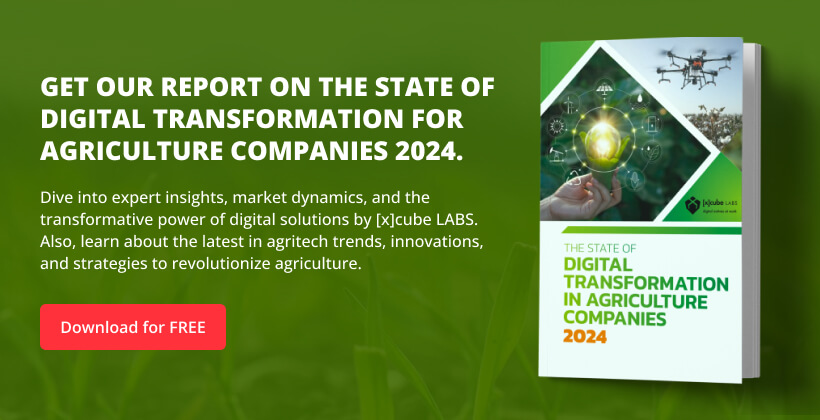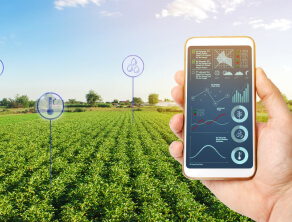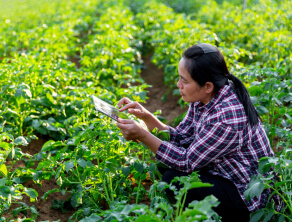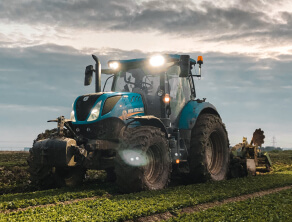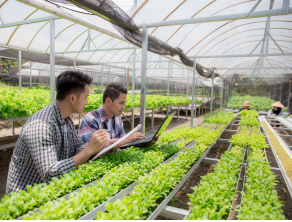Agritech Innovations We Can Expect in 2024 and Beyond.

In the tapestry of agriculture, technology threads a narrative of constant evolution. Approaching the horizon of 2024, the stage is set for a groundbreaking agritech (agriculture technology) chapter. Anticipation looms as pioneering innovations are poised to redefine the agricultural landscape, promising a paradigm shift in farming methodologies.
The canvas of possibilities widens from the assimilation of artificial intelligence and IoT applications propelling precision agriculture to the transformative capabilities of biotechnology and genetic engineering for crop enhancement. Embracing vertical farming, robotics, automation, and intricate data analytics, these innovations herald a promising era of agricultural efficiency and eco-consciousness.
This blog embarks on a journey to uncover the imminent wave of agritech innovations. These developments, which combine technology and agricultural knowledge, have the potential to completely transform farming and provide a window into a future where production, sustainability, and efficiency all live in harmony.
Definition
So what is agritech? Agritech, short for agricultural technology, encompasses a spectrum of innovative solutions and applications that integrate technology into various aspects of farming and agriculture. Its significance lies in its capacity to enhance efficiency, sustainability, and productivity within the agricultural sector.
Agritech leverages cutting-edge technologies such as artificial intelligence (AI), Internet of Things (IoT), robotics, biotechnology, data analytics, and automation to optimize agricultural practices. It aims to address challenges modern farming faces, including resource scarcity, environmental concerns, labor shortages, and the need to sustainably meet escalating global food demands.
Also Read: Exploring Agri-tech: The Technologies Driving Global Agriculture
Brief Overview of Past Agritech Innovations and Their Impact:
Historically, agritech innovations have revolutionized farming practices and significantly impacted the agricultural landscape:
- Precision Agriculture: One of the earliest and most impactful advancements, precision agriculture utilized technology to optimize field-level management, applying resources like water, fertilizer, and pesticides precisely where and when needed. This approach reduced wastage, increased efficiency, and improved crop yields.
- Biotechnology and Genetic Engineering: Innovations in biotechnology, including genetically modified organisms (GMOs) and gene editing techniques like CRISPR, enabled the development of crops with improved traits such as pest resistance, drought tolerance, and enhanced nutritional profiles. These advancements have helped address agricultural challenges and to improve food quality.
- Robotics and Automation: Robotics introduced automation in farming, allowing for mechanized tasks like planting, harvesting, and weeding. This technology has streamlined labor-intensive processes, increased productivity, and minimized human error.
- Data Analytics and Farm Management Software: Integrating data analytics and farm management software has provided farmers valuable insights into weather patterns, soil health, crop growth, and market trends. This information empowers decision-making, optimizes crop planning, and allocates resources.
Looking forward to 2024 and beyond, the trajectory of agritech innovation promises further strides in these areas, emphasizing more sophisticated applications of existing technologies and the emergence of novel solutions tailored to meet evolving agricultural challenges.

Current State of Agritech (2023)
A. Overview of Existing Agritech Solutions and Technologies
The agriculture sector in 2023 is experiencing a transformative shift due to agritech innovations:
- Precision Agriculture: Utilizing AI and IoT, precision agriculture optimizes resource usage and enhances crop yields through data-driven decision-making.
- IoT Applications: Smart sensors and interconnected systems monitor soil health, weather, and livestock, aiding farmers in making informed choices.
- Robotics and Automation: Autonomous drones and machinery streamline farming tasks, reducing labor and boosting productivity.
- Biotechnology and Genetic Engineering: Innovations like CRISPR enable the development of disease-resistant and higher-yielding crops.
- Data Analytics and Software: Big data analytics and farm management software assist in efficient decision-making and resource allocation.
B. Key Challenges Facing Agriculture
Several challenges persist in the agricultural sector:
- Resource Scarcity: Depleting resources like water and arable land necessitates sustainable farming practices.
- Climate Change: Erratic weather patterns demand resilient farming techniques and adaptive crop varieties.
- Access to Technology: Disparities in tech access hinder the widespread adoption of agrotech solutions.
- Regulatory Hurdles: Regulations on GMOs and data privacy require balancing innovation and adoption.
In summary, while agritech holds promise for revolutionizing agriculture in 2023, overcoming challenges like resource scarcity, climate change resilience, tech access, and regulatory constraints is crucial for widespread and sustainable adoption.

Emerging Trends in Agritech
Agriculture technology, or agritech, is witnessing a transformative wave of innovation, paving the way for more efficient, sustainable, and productive farming practices. Let’s delve into the emerging trends poised to redefine agriculture through technological advancements.
A. Precision Agriculture:
- Role of AI and Machine Learning: AI and machine learning algorithms are revolutionizing precision farming by analyzing vast datasets. These technologies aid in predictive modeling, offering insights into optimal planting times, soil health, and crop management practices tailored to specific needs.
- Sensors and IoT Applications: Sensors integrated with IoT applications enable real-time monitoring of environmental factors like soil moisture, temperature, and crop health. This data-driven approach assists farmers in making informed decisions, optimizing resource usage, and minimizing waste.
B. Vertical Farming and Controlled Environment Agriculture:
- Advancements in Indoor Farming Techniques: Vertical farming techniques leverage controlled environments to cultivate crops in stacked layers or vertical structures. Utilizing LED lighting, hydroponics, and aeroponics, this method optimizes space and resources while enabling year-round production.
- Sustainable Practices and Resource Optimization: Controlled environment agriculture promotes sustainable practices by reducing water usage, minimizing pesticide requirements, and decreasing transportation costs through localized production.
C. Robotics and Automation:
- Robotic Solutions: Robotics play a pivotal role in planting, harvesting, and crop maintenance, augmenting human labor. Automated machinery with precision control ensures accurate planting depths, selective harvesting, and targeted crop treatments.
- AI-Driven Farm Management Systems: AI-powered systems analyze data from various sources to optimize farming operations. These systems predict maintenance needs for equipment, schedule tasks efficiently, and provide real-time insights for proactive decision-making.
D. Biotechnology and Genetic Engineering:
- CRISPR and Gene Editing: CRISPR technology enables precise gene editing in crops, facilitating traits like disease resistance, enhanced nutritional value, and increased yields.
- Bioengineering for Disease Resistance and Increased Yields: Biotechnological advancements engineer crops for heightened resilience against pests, diseases, and adverse environmental conditions, ultimately boosting agricultural productivity.
E. Data Analytics and Farm Management Software:
- Integration of Big Data Analytics: Integrating big data analytics empowers farmers to make data-driven decisions. Analysis of large datasets facilitates predictive analytics, risk assessment, and optimization of crop management practices.
- Farm Management Platforms: Advanced farm management software provides comprehensive tools for planning, monitoring, and analyzing farm operations. These platforms streamline processes, from inventory management to financial analysis, enabling efficient and optimized agricultural practices.
Also Read: The Role of ICT in Agriculture.
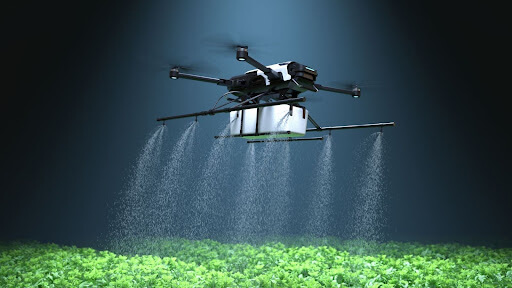
Implications and Benefits of Agritech Innovations
Agritech innovations in agriculture technology yield increased efficiency and productivity by leveraging AI, IoT, and robotics for precise decision-making and automated tasks. These advancements promote sustainability by minimizing resource usage, fostering eco-friendly practices, and reducing environmental impact.
Economically, they empower farmers with improved yields, reduced operational costs, and enhanced market competitiveness. However, challenges such as the digital divide, ethical concerns about data privacy, GMO ownership, and impacts on traditional farming practices require careful navigation and regulatory frameworks to ensure responsible and equitable adoption of these innovations.
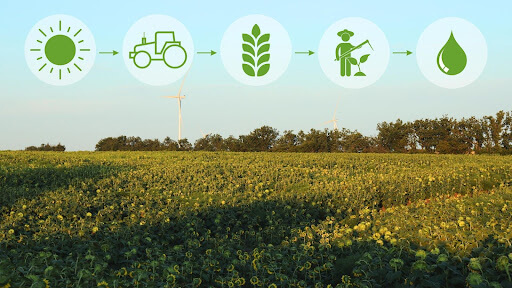
Market Adoption and Investment Landscape
1. Current Market Trends and Projections in Agritech
The agricultural technology (agritech) sector is experiencing an unprecedented surge in growth and innovation. Market trends indicate a remarkable trajectory, showcasing an increasing inclination toward agrotech solutions globally. Projections suggest that by 2024 and beyond, the agritech market will continue its upward momentum, estimated to reach substantial market valuation figures.
Key trends driving this growth include the rising adoption of precision agriculture techniques powered by AI, IoT, and data analytics. There’s a burgeoning interest in vertical farming and controlled environment agriculture, which optimize space and offer sustainable farming solutions. Robotics and automation are becoming integral, streamlining tasks from planting to harvesting, augmenting productivity, and reducing manual labor.
2. Investment and Funding in Agritech Startups and Research
Investment in agritech startups and research initiatives has witnessed a significant uptick in recent years. Venture capitalists, private equity firms, and even traditional agricultural companies are recognizing the potential of agritech and pouring substantial funds into this sector. The investments cover a broad spectrum, including seed funding for startups and large-scale funding for established agrotech companies.
These investments steer research and development efforts, fostering innovation in precision farming, biotechnology, automation, and farm management software. Such financial support enables these ventures to scale their operations, conduct further research, and develop groundbreaking agritech solutions.
3. Government Initiatives and Policies Promoting Agritech Development
Governments worldwide increasingly recognize the pivotal role of agritech in ensuring food security, sustainability, and economic growth within the agricultural sector. Consequently, various policies, incentives, and initiatives are being formulated to promote agritech development.
These initiatives encompass funding programs, tax incentives, research grants, and regulatory frameworks designed to support and accelerate the adoption of agritech solutions. Government support encourages collaboration between research institutions, startups, and established companies to drive innovation and enhance agricultural productivity while ensuring environmental sustainability.
As the agritech sector gains momentum, governments prioritize investments in research and infrastructure to catalyze technology integration into agriculture, fostering a more efficient and resilient food production system.
The confluence of market trends, substantial investments, and supportive government initiatives underscores the promising landscape for agritech, positioning it as a pivotal player in shaping the future of agriculture worldwide.
Watch our webinar: Digital Transformation Opportunities for Agri-input Companies: A [x]cube LABS + UPL Webinar.
Closure
As we conclude our exploration of the future potential and the pivotal role of agritech in shaping the agricultural industry, one thing becomes evident: we stand on the brink of a farming revolution driven by technological prowess. The agriculture landscape is undergoing a profound transformation, and agritech stands as the vanguard leading the charge toward a more sustainable, efficient, and innovative future.
Agritech isn’t just a means to improve agricultural processes; it’s the cornerstone for a more resilient and eco-conscious industry. By optimizing resources, enhancing productivity, and fostering sustainability, agritech paves the way for a future where farming isn’t merely about yields but about harmony with the environment and efficiently meeting global food demands.
Agritech is essentially a fundamental revolution rather than merely an advancement in technology. Its capacity to improve food production, advance agricultural methods, and promote sustainability highlights its crucial role in reshaping the farm environment. We are setting out on a path that promises a better, more productive, and sustainable future for agriculture as we embrace the cutting-edge advances of agritech.
How can [x]cube LABS Help?
Headquartered in Dallas, [x]cube LABS helps enterprises globally with digital transformation and digital technology adoption, with a deep focus on agri-tech.
We have worked with some of the leading global enterprises in the agriculture sector as their digital innovation partners to solve critical problems by taking a highly collaborative approach across the entire digital transformation journey, from ideation and strategizing to experimentation and execution. Our clients include Syngenta, Ellingson Companies, Yara International, and more.
We’re a trusted AWS partner and one of the first 13 companies globally certified as a Google Developer Agency.
We have delivered innovative digital technology-powered solutions for all stakeholders across the agriculture value chain, including growers and input companies. Our agriculture innovation and solutions team has extensive domain knowledge, deep technical expertise, and experience in orchestrating a mix of digital technologies to deliver innovative solutions, including IoT, virtual reality, artificial intelligence, deep learning, and more.
Contact us to discuss your digital innovation plans, and our experts would be happy to schedule a free consultation!
![Blog-[x]cube LABS](https://d6fiz9tmzg8gn.cloudfront.net/wp-content/uploads/2016/06/blog_banner.jpg)
